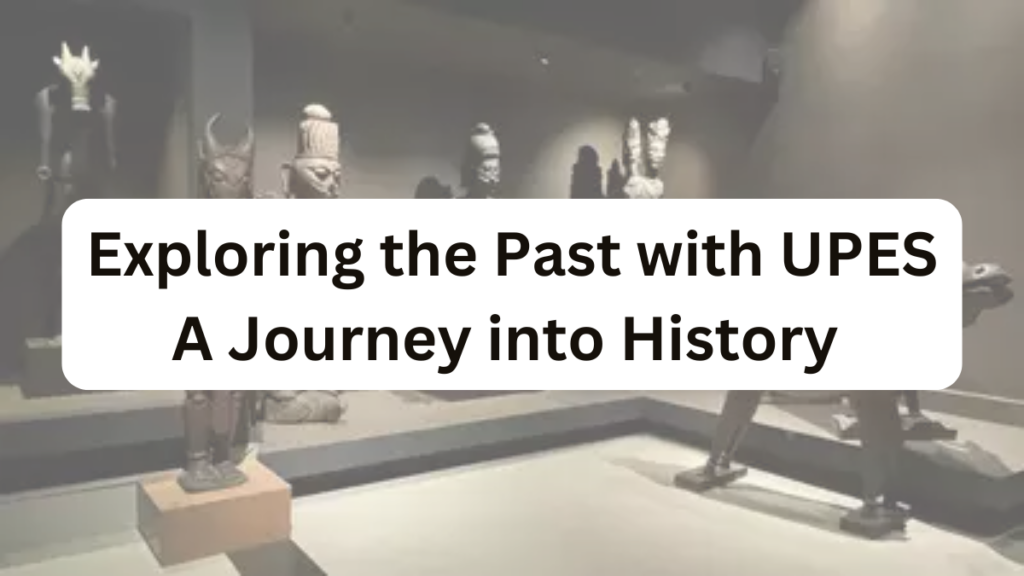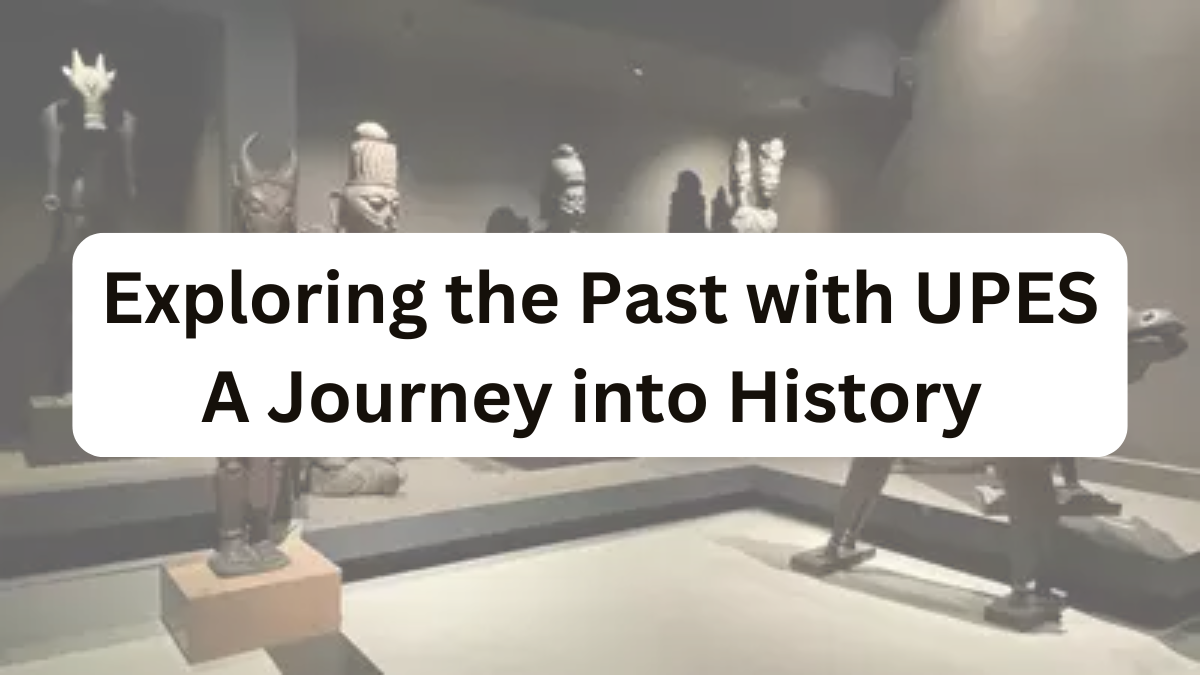History is more than just facts and dates—it’s a vibrant journey through time that allows us to connect with the stories, cultures, and civilizations that shaped the world we live in today. Imagine walking the streets of ancient Pataliputra during Emperor Ashoka’s reign, debating philosophy at Nalanda University, or boarding a Chola ship destined for Srivijaya.
While a time machine remains a fantasy, the B.A. (Hons.) in History program at UPES School of Liberal Studies and Media brings these moments to life with engaging experiences and interactive learning.

Why Choose UPES for History Studies?
The UPES School of Liberal Studies and Media offers a comprehensive History program that merges traditional learning with practical exposure. Here’s what makes it unique:
Key Highlights of the Program
- Field Trips: Regular visits to historical sites, museums, and landmarks for immersive learning.
- Hands-on Archaeology: Practical training in examining artifacts, inscriptions, and ancient architecture.
- Faculty Collaboration: Opportunities to work alongside expert professors on research projects.
- Focus on Regional History: Special attention to the history and archaeology of the Garhwal and Kumaon Himalayas.
- Interdisciplinary Learning: The program integrates subjects such as anthropology, sociology, and political science, providing a broader understanding of historical contexts.
Uncovering Lost Histories and Narratives
History is filled with untold stories waiting to be discovered. At UPES, students learn to decode these forgotten narratives through:
Studying Artifacts and Ancient Objects
The B.A. (Hons.) in History program introduces students to fascinating artifacts such as:
- Ceramics
- Beads and Terracotta
- Animal Bones and Fossils
These objects serve as clues to understanding how ancient communities lived, worshipped, and organized their societies. Such material evidence complements written records and helps reconstruct the social, cultural, and economic aspects of bygone eras.
Archaeological Techniques and Practices
To develop a well-rounded understanding of history, UPES offers dedicated archaeology courses that train students in:
- Studying architectural ruins
- Decoding inscriptions and ancient texts
- Analyzing skeletal remains to understand human evolution
Students also gain hands-on experience through excavations, museum cataloging, and artifact preservation, ensuring they build practical skills essential for careers in archaeology.
Immersive Learning Beyond the Classroom
At UPES, learning history is not confined to lecture halls. Students are encouraged to step out and explore the historical richness of Uttarakhand and its neighboring regions. These excursions deepen their understanding of:
- The Garhwal and Kumaon Himalayas: A crucial region for spiritual and political developments in Indian history.
- Ancient Temples and Forts: Sites that reveal India’s architectural brilliance and religious practices.
- Museums and Heritage Centers: Giving students a closer look at artifacts, manuscripts, and historical records.
These real-world experiences bring textbook knowledge to life, helping students grasp the tangible connections between the past and present.
Developing Critical Thinking Skills
The History program at UPES emphasizes developing essential skills that go beyond memorizing facts. Students are trained to:
Master Source Analysis
Engaging with primary and secondary sources is a vital skill for historians. Students learn to:
- Evaluate ancient manuscripts, inscriptions, and oral histories
- Identify gaps, biases, and multiple interpretations in historical records
- Build evidence-based arguments with well-researched conclusions
Engage in Historical Debate
By analyzing conflicting viewpoints, students develop their own interpretations and engage in academic debates. This critical thinking approach sharpens their reasoning skills and helps them understand diverse perspectives on historical events.
Research-Oriented Learning
UPES encourages students to undertake independent research projects. These projects focus on unexplored historical themes, regional studies, or lesser-known cultural narratives. Faculty members guide students through the process, teaching them to:
- Identify research questions
- Collect and analyze historical data
- Present their findings in academic journals, conferences, or university publications
Career Opportunities for History Graduates
A degree in History from UPES equips students with versatile skills that are valued across various industries. Graduates can explore diverse career paths such as:
| Career Path | Potential Roles |
|---|---|
| Academia & Research | Lecturer, Historian, Archivist |
| Museums & Heritage | Curator, Conservationist |
| Media & Journalism | Researcher, Content Writer |
| Public Policy & Governance | Policy Analyst, Cultural Advisor |
| Tourism & Travel | Heritage Guide, Travel Blogger |
Non-traditional Career Options
In addition to conventional career roles, UPES History graduates excel in unconventional fields such as:
- Creative Writing: Using historical narratives to craft novels, screenplays, or documentaries.
- Gaming Industry: Assisting in designing historically accurate game settings and storylines.
- Digital Marketing: Creating engaging content for heritage brands, museums, or historical tourism websites.
The research, analysis, and communication skills gained through the program open up countless professional opportunities in India and abroad.
Alumni Success Stories
Several UPES graduates have successfully transitioned into rewarding careers after completing their History degree. Alumni have:
- Worked with prestigious museums and heritage organizations
- Published historical research papers in reputed journals
- Pursued higher education in renowned institutions worldwide
FAQs
1. What makes the UPES History program unique?
UPES combines theoretical knowledge with hands-on learning experiences such as field trips, archaeological studies, and practical research, offering a well-rounded education in History.
2. Are there opportunities for practical experience in this program?
Yes, students participate in regular field visits, museum tours, and research projects that provide real-world insights into historical and archaeological studies.
3. What skills will I develop in this program?
Students gain expertise in research, critical thinking, data interpretation, and constructing evidence-based arguments—valuable skills across multiple industries.
4. What career opportunities can I pursue with a History degree from UPES?
Graduates can explore roles in academia, museums, tourism, journalism, public policy, and even international relations, thanks to their versatile skills and deep understanding of historical narratives.
5. Does UPES offer support for pursuing higher studies in History?
Yes, UPES guides postgraduate studies, research scholarships, and connections with international universities for advanced learning opportunities.
Embark on a journey through time with the UPES B.A. (Hons.) in History program—where the past comes alive through interactive learning, immersive field trips, and research-driven exploration.
Click here to learn more
